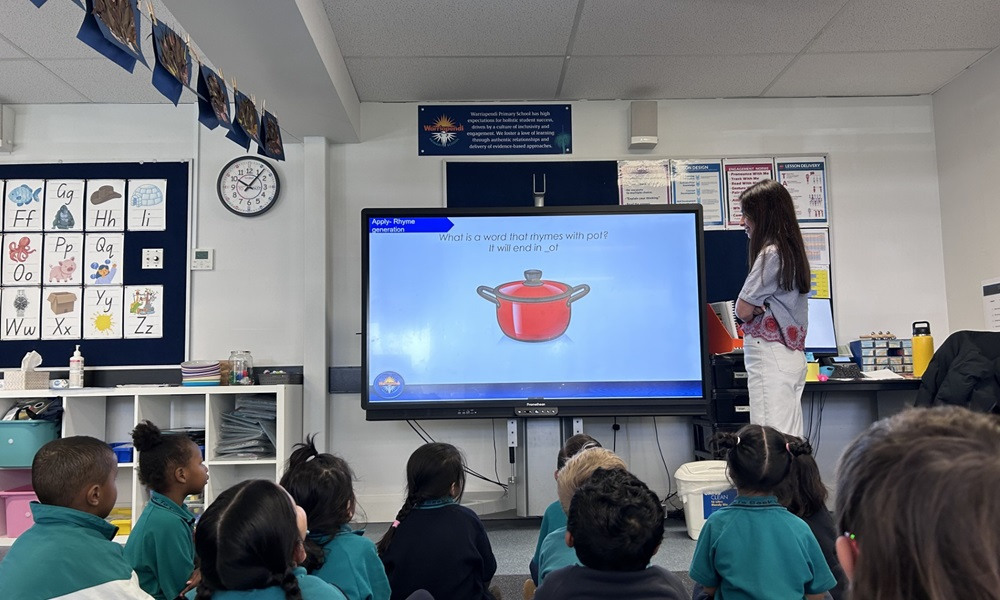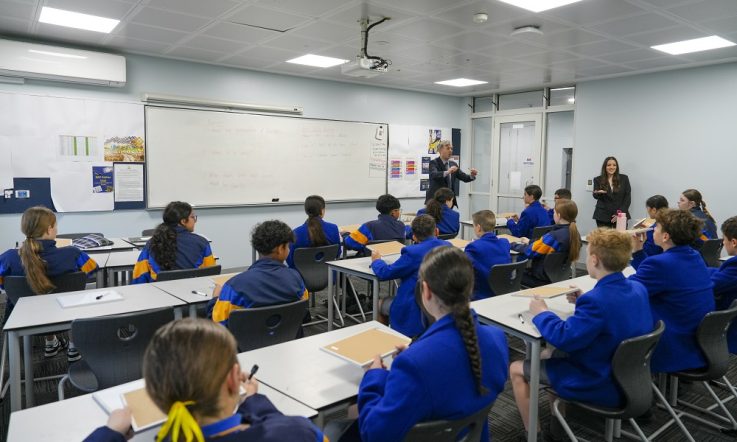At Warriapendi Primary School (WPS) in Perth, Western Australia, the leadership team has been on a journey to build instructional capacity to lift student outcomes since Principal Matt Pinkard joined in 2022. In a 3-part series for Teacher, Pinkard and Associate Principals at WPS, Deann Jones and Roxanne Righton, share what’s happened so far and the progress they’ve made in literacy instruction. In part one, the team discuss how they’ve cultivated a positive school culture to lay the foundation for building instructional capacity.
This is the first of 3 articles we’ve written for Teacher. It provides a brief overview of what’s been happening at our school in recent years. We’ll be sharing more about one specific area of change in the next 2 instalments, but if you’d like more detail, feel free to reach out to us.
Warriapendi Primary School (WPS) is located in the Perth suburb of Balga. The school community is culturally diverse, with approximately 65% of students speaking a language other than English at home and 10% identifying as Aboriginal or Torres Strait Islander. We have a genuine mix of families at our school, and many have low socioeconomic backgrounds. Balga is certainly a suburb in transition with a growing population.
Matt Pinkard has been Principal at WPS since 2022 and has overseen significant positive change and refinement across those 4 years, particularly in relation to building instructional capacity. Thanks to the school’s prior involvement in the Fogarty EDvance Program, a strong foundation was in place, providing the leadership team with the challenge of how best to add value in a way that is evidence-based, highly impactful and sustainable.
Establishing a moral purpose
Our initial focus was on culture and having the right people on board for the journey. During the early stages, effective and very intentional recruitment played a significant role in attracting talented, highly committed staff with a passion for working in lower socioeconomic index (SEI) settings and delivering content explicitly, to complement the existing skilled staff. This presented us with a unique opportunity to genuinely redefine what WPS stood for and the direction we wished to head as a team.
We set about creating a shared moral purpose; a statement that captures the essence of what we believe and expect of one another and our school community:
Warriapendi Primary School has high expectations for holistic student success driven by a culture of inclusivity and engagement. We foster a love of learning through authentic relationships and delivery of evidence-based approaches.
Our moral purpose was then displayed in every classroom and building throughout the school, providing a constant reminder and useful reference point for staff when speaking with each other, students and parents.
Valuing staff expertise and time
From here, we prioritised codifying all school-wide processes and procedures to reduce cognitive load for staff and increase consistency. An example being our morning arrival and student collection process that was introduced to increase safety. As students enter the school grounds, they line up in our undercover area in rows with their classmates. Student leaders support this process by acknowledging those displaying the desired behaviour. This routine enables the principal to effectively check-in with all students and provides them with a calm, orderly start to the day. At 8:30am, staff arrive to greet their students and lead them to the classroom. We clearly defined all roles throughout the school and made leadership structures, change-management and decision-making processes easy to understand and highly visible.
We identified opportunities to increase purposeful collaboration by shifting the focus of staff meetings from always being whole-of-staff gatherings primarily used for information sharing, to a balanced structure that includes both Phase of Learning Team (POLT) and whole-staff meetings. POLTs are broken into K-2, 3-6 and Specialists to ensure all teachers have a voice and are involved in decision-making processes. Each meeting was guided by an impactful agenda aligned with the school’s improvement priorities, with a strong emphasis on respecting staff time. Meetings began with a team health check to prioritise staff wellbeing and support a positive, collaborative culture.
At our school, leadership begins with credibility. School leaders are skilled practitioners and classroom teachers themselves, responsible for daily lesson delivery and modelling best practice. We lead from the front, demonstrating high standards, sharing responsibility, and building trust through consistent, visible actions. We are inspired by James Kerr’s Legacy (2015), especially the principle of ‘sweeping the sheds’, where leaders model behaviours they want to see. For us, actions in this space can be as simple as undertaking playground duties multiple times each week or taking lessons to relieve staff for peer observations. The mindset is that no individual is too important to perform the small, often overlooked tasks that contribute to the team's overall success.
This approach underpins a culture of collective responsibility and mutual respect, where relationships are prioritised and strengthened through small, frequent acts of solidarity. We understand that culture doesn’t take care of itself, it must be continuously nurtured. From intentional staff appreciation initiatives to real-time positive feedback and celebration of strong practice, we deliberately invest in the wellbeing and morale of our team.
Examples include:
- A staff social committee to foster connection
- Scheduled appreciation events
- Fortnightly recognition through a simple reward system
- Regular public celebration of staff contributions
- Personalised, face-to-face feedback from leaders
- Sharing of positive parent feedback
Our induction processes play a key role in reinforcing shared values and expectations. We take pride in our low-variance K–6 teaching approach, where consistency enhances student success without compromising teacher individuality. While some lessons are supported by scripted elements, most are crafted by teachers using a predictable structure that supports cognitive clarity and student confidence. We’ve found that, contrary to criticism from some that it’s a restrictive approach, our approach allows staff to bring their full personality and professional judgement to their teaching – within a shared, high-impact framework that is supported by research.
Respecting students’ time
At WPS, staff meetings and school development days often highlight the importance of respecting the students’ time and maximising the impact we have on their learning. School leaders discuss the challenging and often complex home lives that many of our students have, how impressive it is that they manage to show up to school regularly, and how imperative it is that we respect this effort by providing them with a world-class education, every day.
We are often playing academic and social catch up from the moment students enter our school in kindergarten. By respecting their time, not labelling them or allowing deficit talk, we ensure that our team squeezes the absolute maximum out of every day.
It’s not possible to do everything, as much as we sometimes might want to. We’ve had to prioritise what is needed for our students in our context by removing less impactful activities or incorporating them into the day – we calculate every minute available. Staff have been receptive to this exercise, which we revisit often. For example, students do not have frequent extended brain breaks during the school day, rather, they have movement cleverly intertwined into every lesson.
Our Literacy and Numeracy blocks are prioritised and preserved at all costs and every single minute matters. We avoid unnecessary interruptions and deliberately schedule events like excursions, incursions and assemblies for afternoons. Our weekly Duties Other Than Teaching (DOTT) schedule is structured to avoid regular disruptions to Literacy and Numeracy for our staff and students, and all intervention and therapy follows suit.
‘Culture drives performance’
We leave nothing to chance in our school and are constantly monitoring, evaluating and refining what we do for the betterment of our students. Culture drives performance in a school and we knew that strategy and planning alone would not get our school to where we wanted it to go.
Having a moral purpose that specifically referenced high expectations for student success was something our entire team felt was important. We sought to never allow ourselves or our students to be defined by their postcode. We are firm believers in not capping students – when they are ready, we move them on to the next logical step in their learning journey. We openly share these high expectations with our students and instil in them a firm belief that they can do anything they set their mind to.
Stay tuned: Next week, Matt Pinkard, Deann Jones and Roxanne Righton share the details of how they’ve built instructional capacity in literacy at WPS.
References
Kerr, J. (2015). Legacy. Little Brown. https://www.hachette.com.au/james-kerr/legacy
In this article, the WPS leadership team share their mindset that no individual is too important to perform the small, often overlooked tasks that contribute to the team's overall success. As a school leader, can you think of a recent example of when you did this yourself? How regularly are you able to contribute to your team’s success in this way?
We welcome article contributions from educators, whatever their role, school sector or location. Read our quick guide to article submissions here.



